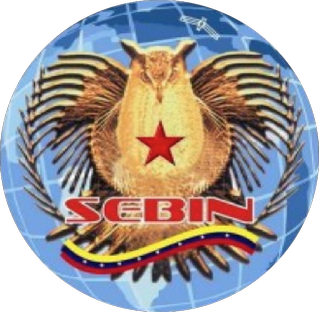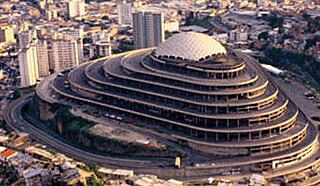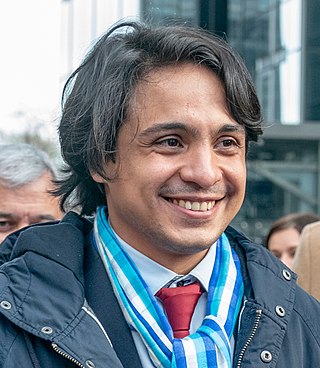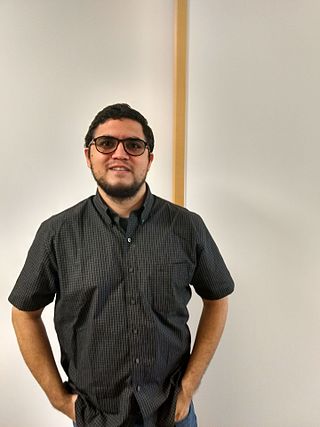
Solitary confinement is a form of imprisonment in which an incarcerated person lives in a single cell with little or no contact with other people. It is a punitive tool used within the prison system to discipline or separate incarcerated individuals who are considered to be security risks to other incarcerated individuals or prison staff, as well as those who violate facility rules or are deemed disruptive. However, it is also used as protective custody on incarcerated individuals whose safety is threatened by others in order to separate them from the general prison population.

The Bolivarian National Intelligence Service is the premier intelligence agency in Venezuela. SEBIN is an internal security force subordinate to the Vice President of Venezuela since 2012 and is dependent on Vice President Delcy Rodríguez. SEBIN has been described as the political police force of the Bolivarian government.

Leopoldo Eduardo López Mendoza is a Venezuelan opposition leader. He co-founded the political party Primero Justicia in 2000 with Julio Borges. López was elected mayor of the Chacao Municipality of Caracas in the regional elections held in July 2000. He is the National Coordinator of another political party, Voluntad Popular, which he founded in 2009.
White torture, often referred to as white room torture, is a type of psychological torture technique aimed at complete sensory deprivation and isolation. A prisoner is held in a cell that deprives them of all senses and identity. It is particularly used in Iran; however, there is also evidence of its use by the Venezuelan and the United States intelligence services.
Law enforcement in Venezuela is highly fragmented, being split across multiple police agencies of various types.

Antonio José Ledezma Díaz is a Venezuelan lawyer, politician and former political prisoner. After unsuccessfully challenging for the leadership of Democratic Action in 1999, he founded a new party, the Fearless People's Alliance.

The record of human rights in Venezuela has been criticized by human rights organizations such as Human Rights Watch and Amnesty International. Concerns include attacks against journalists, political persecution, harassment of human rights defenders, poor prison conditions, torture, extrajudicial executions by death squads, and forced disappearances.

The Policía Nacional Bolivariana is Venezuela's national police force, created in 2009. Law enforcement in Venezuela has historically been highly fragmented, and the creation of a national police force was originally unpopular among the public and organizations. The creation of a National Police was one of the recommendations of a 2006 National Commission on Police Reform (CONAREPOL). At the time that the force was set up, the wage rate for officers in the new force was three times higher than that in existing forces.
Gustavo Enrique González López is the former Venezuelan Minister of Popular Power for Interior, Justice and Peace (MPPRIJP) in 2015-2016 and is the current director of the National Intelligence Service (SEBIN).

Bassil Da Costa was a Venezuelan university student, killed during the 2014 protests against the Venezuelan government, the first death of the wave of protests. Da Costa was a marketing student at the Universidad Alejandro de Humboldt in Caracas.
Inés Margarita González Árraga is a Venezuelan former political prisoner, currently living in exile.

El Helicoide is a building in Caracas, Venezuela owned by the Venezuelan government and used as a facility and prison for both regular and political prisoners of the Bolivarian National Intelligence Service (SEBIN). In the shape of a three-sided pyramid, it was originally constructed as a shopping mall, but never completed.

Torture in Venezuela has been a consistent phenomenon in recent years, especially during the crisis in Venezuela. The United Nations, Organization of American States, Amnesty International, Human Rights Watch and Foro Penal have documented acts of torture and violence towards real or perceived opponents of the Bolivarian government, mainly detainees, including by state institutions such as the Bolivarian National Intelligence Service (SEBIN).
Fernando Alberto Albán Salazar was a Venezuelan–Colombian activist, lawyer, politician, and prominent figure within the Justice First opposition party. Albán served as a councilman of the Libertador Municipality of Caracas from 2012 until his death in office in 2018.

Lorent Enrique Gómez Saleh is a Venezuelan activist. Since 2011, Saleh has participated in several activities in defense of human rights and has been repeatedly detained by the Venezuelan authorities. In 2014, he was deported from Colombia and handed over to officials of the Bolivarian Intelligence Service (SEBIN). Until 2018, he was being held in La Tumba, in Plaza Venezuela, Caracas during which time his audience had been postponed 52 times. On 12 October 2018, he was released by the Venezuelan authorities and exiled to Spain, where he arrived the next day after landing at the Madrid–Barajas Airport.

Geraldine Patricia Chacón Villarroel is a lawyer, human rights advocate and student of Liberal Studies at the Universidad Metropolitana in Caracas. Chacón was declared a prisoner of conscience by Amnesty International who issued an urgent action calling for her immediate and unconditional release on 27 April 2018.
Roberto Eugenio Marrero Borjas is a Venezuelan attorney, politician, and chief of staff to Juan Guaidó; he was arrested by SEBIN during a raid on his home in the early morning hours of 21 March 2019, and detained in El Helicoide, a prison run by SEBIN and "considered the country's largest torture center" according to Clarín. Marrero is also an attorney for Leopoldo López; López is Guaidó's mentor and a political prisoner.

Golpe Azul, also known as Operation Jericho, was an accusation by the Venezuelan government the resulted in the arrest of several people, including the metropolitan mayor of Caracas Antonio Ledezma. The accusation consisted in an alleged coup d'état plan against the presidency of Nicolás Maduro, which reportedly would take place on 12 February 2015 and would have several targets in Caracas. The name of the plan refers to the blue uniform of the Venezuelan Air Force in which several suspects were officers.

The Presidential Honor Guard is the military brigade responsible for the immediate security of the president of Venezuela. The current head of the Presidential Honor Guard is Iván Hernández Dala.

Luis Carlos Díaz Vázquez is a Venezuelan journalist and cyberactivist. He has worked at the Instituto Radiofónico Fe y Alegría, the Centro Gumilla and newspapers such as El Nacional and Tal Cual, as well as a radio host at Circuito Unión Radio, and served as a member of the editorial board of SIC magazine. Luis Carlos was arbitrarily detained in 2019 by agents of the Bolivarian Intelligence Service (SEBIN) during the nationwide blackouts of that year, being declared by Amnesty International as a prisoner of conscience. He was released the following day with precautionary measures and his case was archived in 2021, suspending such measures.














